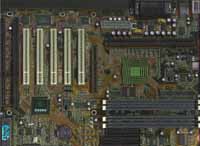Soyo SY-6BA BX Pentium II Board
by Anand Lal Shimpi on April 28, 1998 1:12 PM EST- Posted in
- Motherboards
How does the SY-6BA from Soyo (and MTech) compare to the competition? Was quality sacrificed in order to release a product earlier than the competition or is this another down right decent effort on the part of two outstanding manufacturers? Let's find out.
Anand Tech Report Card Rating 93/A-
| CPU Interface | Slot-1 |
| Chipset | Intel 440BX |
| L2 Cache | N/A (on-chip) |
| Form Factor | ATX |
| Bus Speeds | 66 / 75 / 83 / 100 / 112 MHz |
| Clock Multipliers | 2.0x - 5.0x |
| Voltages Supported | 1.5v - 3.5v (Auto Detect) |
| Memory Slots | 4 168pin DIMM Slots (EDO/SDRAM) |
| Expansion Slots | 1 AGP Slot 5 PCI Slots 2 ISA Slots (1 Shared / 2 Full Length) |
| BIOS | Award PnP BIOS |
Dual Voodoo2's, a SCSI card, a Network card, a modem, and an AGP Video card...you think you have everything necessary for your new system, except for the hot new PCI sound card that's on its way to your house. When the package arrives, unpacking it reveals that you just spent $150 on a card that can't fit in your current motherboard because you have already occupied all 4 of your PCI slots. While the frustration is building in your mind what else could you do? Toss out that pretty new Sound Card? Ditch the Network Card? How about keeping all of your peripherals, and trading up that aging motherboard for a new model, the one-two punch MTech and Soyo provides you with in their first cooperative project, the SY-6BA, would do just fine.
| The large ATX form factor of the 6BA easily accommodates the 5 PCI slots, 2 ISA, 1 AGP, and the 4 DIMM slots backed up by the security of a 6-chip external Texas Instruments DRAM Buffer designed to prevent instability when making use of all 4 memory banks. One thing you won't see on the 6BA is an abundance of jumpers, as this board features a Jumperless CPU Setup much like Chaintech's See-PU setup while retaining its own individual qualities. The setup allows you to select from a list of bus speeds (if you choose not to use the pre-defined settings for your processor) ranging from 60MHz to 112MHz, and luckily Soyo took the initiative to allow overclocking on their board since it doesn't auto-detect whether or not you have a 66MHz Bus Pentium II. So you Pentium II 300 and Celeron owners out there will be safe with the knowledge that this 5 PCI slot BX board, unlike some others out there, actually tailors to your desire for speed. |  |
The Award BIOS also takes the liberty of recommending what SDRAM CAS Latentency you should set in the Chipset Features Setup by using the on-board Serial Presence Detect on your SDRAM as a means of communication. How accurate are the 6BA's suggestions? Well, for both the Memory Man and Corsair PC100 SDRAM used in the motherboard tests the 6BA recommended a CAS latency of 3, while during the actual tests the setting was left at 2 without any problems. Not to say that the recommendations are incorrect, they are just geared towards stability over performance.
The SY-6BA's box contains the usual bells and whistles, a set of HDD/FDD cables, the Slot-1 SEC CPU Retention Set, an Installation CD-ROM and a "Quick Start Guide." The 8.5" x 11" paper on which the Quick Start Guide is crisply printed can come in handy if you're not too familiar with the Pentium II motherboard design, however absent from the package was a hard copy of anything resembling a User's Manual. Nevertheless, the Quick Start Guide provides you with a small introduction to the fairly basic Award BIOS Setup and CPU Configuration Utility.
The stability of the SY-6BA is pretty much par when compared with the rest of the best out there today, no real problems were posed during the test runs and this board can be recommended over the Tyan Tsunami in virtually all categories. The performance of this board is much like that of the ABIT BX6, however it still falls a short distance from the first place performance winner, the ASUS P2B.
A 133MHz bus speed setting would've been nice as well, while this setting requires extremely fast SDRAM it has been proven to work, taking overclocking to new levels.
Soyo SY-6BA Chipset Features Setup |
|||
| Item | Recommended Settings | ||
| EDO/SDRAM 66/75/83MHz Bus | SDRAM 100/112MHz Bus | Safe | |
| SDRAM CAS Latency Time: | 2 | 3 | Auto |
| DRAM Data Integrity Mode: | Non-ECC | Non-ECC | Non-ECC |
| System BIOS Cacheable: | Enabled | Enabled | Disabled |
| Video BIOS Cacheable: | Enabled | Enabled | Disabled |
| Video RAM Cacheable: | Disabled | Disabled | Disabled |
| 8 Bit I/O Recovery Time: | 1 | 4 | 4 |
| 16 Bit I/O Recovery Time: | 1 | 2 | 2 |
| Memory Hole At 15M-16M: | Disabled | Disabled | Disabled |
| Passive Release: | Enabled | Enabled | Disabled |
| Delayed Transaction: | Enabled | Enabled | Disabled |
| AGP Aperture Size (MB): | 64 | 64 | 64 |
Recommended SDRAM: Corsair PC100 SDRAM; Memory
Man PC100 SDRAM
SDRAM Tested: 1 x 64MB Corsair PC100 SDRAM; 1 x 64MB Memory-Man PC100 SDRAM
Manufacturer: Corsair Microsystems
Purchase Web-Site: http://www.nf-ny.com
Manufacturer: The Memory Man
Purchase Web-Site: http://www.memory-man.com










0 Comments
View All Comments